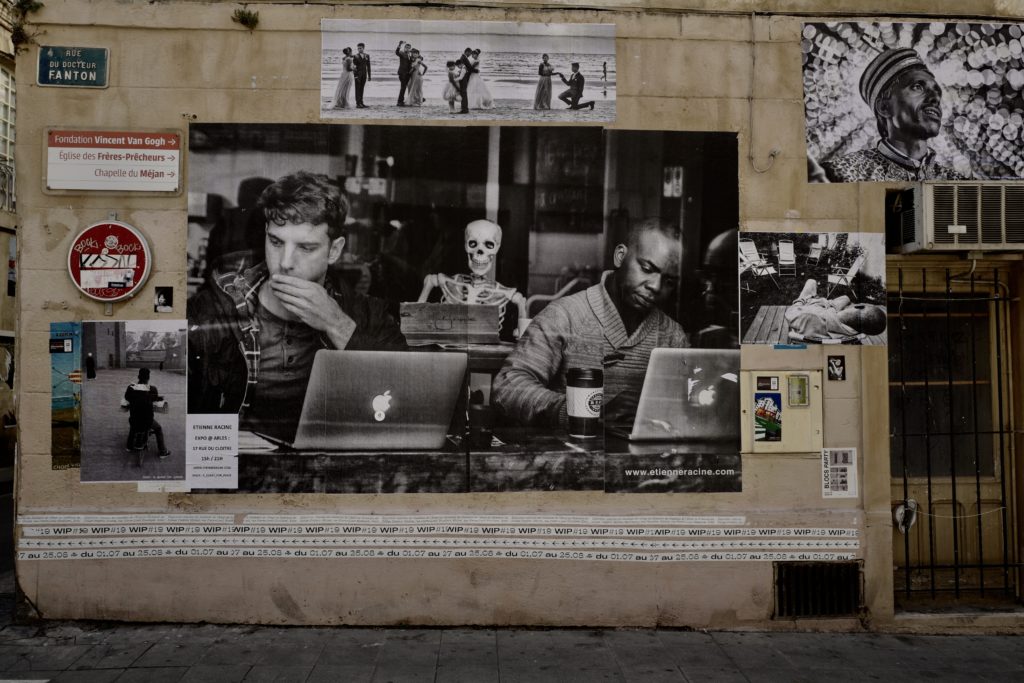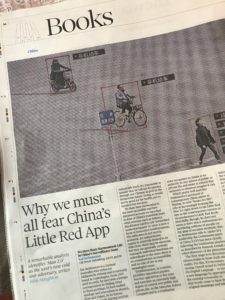Seen on a street in Arles. Actually, they were herbs. But they needed watering.
Mortality
Heads-up
Networked totalitarianism, courtesy of Western tech companies
Nice investigation by The Intercept:
AN AMERICAN ORGANIZATION founded by tech giants Google and IBM is working with a company that is helping China’s authoritarian government conduct mass surveillance against its citizens, The Intercept can reveal.
The OpenPower Foundation — a nonprofit led by Google and IBM executives with the aim of trying to “drive innovation” — has set up a collaboration between IBM, Chinese company Semptian, and U.S. chip manufacturer Xilinx. Together, they have worked to advance a breed of microprocessors that enable computers to analyze vast amounts of data more efficiently.
Shenzhen-based Semptian is using the devices to enhance the capabilities of internet surveillance and censorship technology it provides to human rights-abusing security agencies in China, according to sources and documents. A company employee said that its technology is being used to covertly monitor the internet activity of 200 million people…
Usual story. When it comes to it, there is no technology that Western tech companies won’t sell to the Chinese.
Why traditional political parties are in trouble
Perceptive NYT article on the stress fractures now materialising in the two big political parties.
WASHINGTON — On the night that he conceded defeat in 1992 after the most successful independent presidential campaign of the last century, Ross Perot made it clear that he was not done shaking up the established order. “Believe me,” he declared, “the system needs some shocks.”
So perhaps it was only fitting that on the same week that Mr. Perot died nearly 27 years later, both of the two major political parties were being rattled by the aftershocks of the earthquake that his campaign represented. President Trump was busy quarreling with former Speaker Paul D. Ryan while the current speaker, Nancy Pelosi, was bickering with first-year House Democrats.
In both cases, those who represented the institutional order, Mr. Ryan and Ms. Pelosi, found themselves at odds with rabble-rousers within their own parties agitating for change from outside the traditional system through the power of social media. This was not a week that showcased the competition between the parties but within them. The stress fractures that Mr. Perot identified a generation ago are tearing at the foundations of the Republican and Democratic Parties.
The same process is evident in the UK.
Fines don’t work. To control tech companies we have to hit them where it really hurts
Today’s Observer comment piece
If you want a measure of the problem society will have in controlling the tech giants, then ponder this: as it has become clear that the US Federal Trade Commission is about to impose a fine of $5bn (£4bn) on Facebook for violating a decree governing privacy breaches, the company’s share price went up!
This is a landmark moment. It’s the biggest ever fine imposed by the FTC, the body set up to police American capitalism. And $5bn is a lot of money in anybody’s language. Anybody’s but Facebook’s. It represents just a month of revenues and the stock market knew it. Facebook’s capitalisation went up $6bn with the news. This was a fine that actually increased Mark Zuckerberg’s personal wealth…
Data can be as toxic as fossil fuel reserves
This morning’s Observer column:
”Data is the new oil” is a tired metaphor designed to capture the fact that, just as the old economy ran on oil, so the new digital economy runs on data. Just as plentiful reserves of underground oil were good for oil companies, so the possession of masses of data would likewise be a great asset for tech companies lucky enough to have it. And whether or not they count it explicitly as an asset on their balance sheets, in practice it gives them a powerful bulwark against competitors and startups. It’s no longer enough for a couple of grad students to come up with a better search algorithm than Google’s, for example; they would also have to build a global network of massive server farms – and have acquired exabytes of data. So possession of large quantities of data greatly heightens the barrier to entry for competitors and thereby strengthens incumbents. The more data you have, the better.
The ICO’s recent fines, however, cast a shadow on this cosy scene. Possessing oodles of data is only an unalloyed good if you can protect it from thieves, hackers and other criminals. If you can’t, then that precious asset can suddenly turn toxic – just like fossil fuel reserves….
Networked totalitarianism
My Observer review of Kai Strittmatter’s remarkable new book.
Kai Strittmatter is a German journalist who writes for Süddeutsche Zeitung and is currently based in Copenhagen. From 1997 until recently, he had been a foreign correspondent in Beijing. Prior to those postings, he had studied sinology and journalism in Munich, Xi’an and Taipei. So he knows China rather well. Having read his remarkable book, it’s reasonable to assume that he will not be passing through any Chinese airport in the foreseeable future. Doing so would not be good for his health, not to mention his freedom.
We Have Been Harmonised is the most accessible and best informed account we have had to date of China’s transition from what scholars such as Rebecca MacKinnon used to call “networked authoritarianism” to what is now a form of networked totalitarianism. The difference is not merely semantic. An authoritarian regime is relatively limited in its objectives: there may be elections, but they are generally carefully managed; individual freedoms are subordinate to the state; there is no constitutional accountability and no rule of law in any meaningful sense.
Sign up for Bookmarks: discover new books in our weekly email
Read moreTotalitarianism, in contrast, prohibits opposition parties, restricts opposition to the state and exercises an extremely high degree of control over public and private life…
Facebook’s data-powered navel-gazing
From Recode…
Facebook built internal tools to manage its damaged reputation when it should’ve been managing bigger issues. A Bloomberg report found that starting in 2016, Facebook developed and deployed two internal tools, dubbed Stormchaser and Night’s Watch, to track and combat misinformation about the company and its CEO Mark Zuckerberg. The tools also measured shifting public sentiment towards Facebook and its leaders.
Why it’s a big deal: Facebook was devoting its resources to managing its own reputation at a time when fake news and political manipulation were propagating on its platform.
What happens now: Facebook told Bloomberg it’s stopped using its Stormchaser tool, but the technology still exists. [Mark Bergen and Kurt Wagner / Bloomberg]
Chinese cheques
From Technology Review:
The People’s Bank of China is paying close attention to Libra, the digital currency Facebook has created. And it may inspire the bank to accelerate its plans to speed up its own project to develop a digital currency.
The news: The PBOC is paying “high attention” to Libra, according to Wang Xin, director of the bank’s research bureau. Speaking at an academic conference at the University of Peking, Wang expressed concern over how Libra might affect the world’s financial system if it takes off, according to the South China Morning Post: “Would it be able to function like money, and accordingly, have a large influence on monetary policy, financial stability, and the international monetary system?”
One thing China wants to know is what role the US dollar will play in the basket of fiat currencies that will supposedly back Libra coins. If it is most closely associated with the dollar, Wang said, “there would be in essence one boss, that is the US dollar and the United States. If so, it would bring a series of economic, financial, and even international political consequences.”




